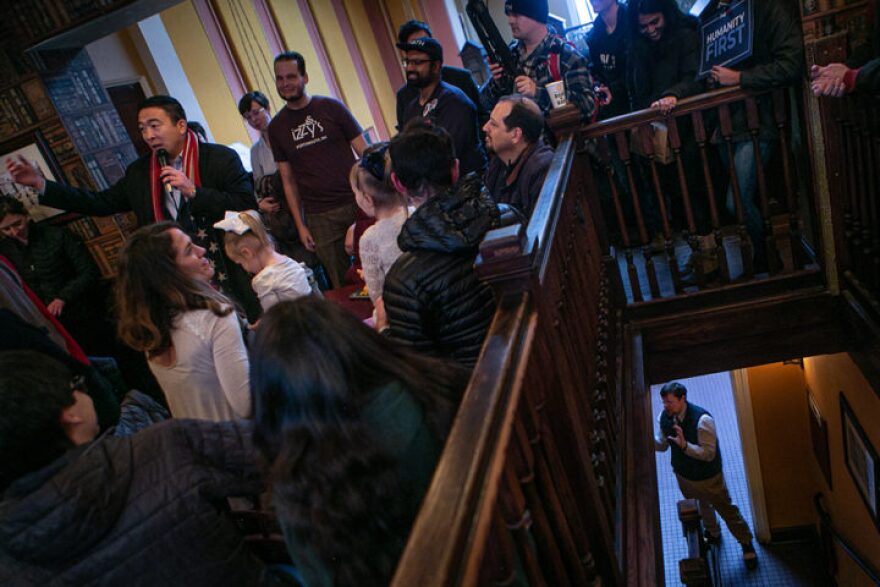PORTSMOUTH, New Hampshire — In this border city at the end of 2019, siblings Matthew and Cassandra Bickerstaff of York stood at the back of a crowd, straining to catch a sight of Democratic presidential candidate Andrew Yang give a stump speech in a small bar.The Democratic candidate was in Portsmouth as part of a New Year’s Eve tour in the Granite State. It was as close to Maine as he and most other 2020 contenders had been last year, aside from a September spurt of activity and quick trips from minor candidates across the border.
Of the 12 Democratic candidates who qualified for Maine’s primary ballot, only two frontrunners are showing sustained interest in the state ahead of the March 3 contest. The early-voting New Hampshire and Iowa, as well as bigger states including California and Texas running primaries the same day, will largely drown Maine out until the general election.
The easy access to presidential visits in southern Maine, however, makes it feel local enough for the Bickerstaffs.
“To be so close to the action, it’s like we forget we’re in a small town,” Matthew Bickerstaff said.

Yang, who is polling at 4 percent in early-voting states, according to the Morning Consult, gave a stump speech first at Cure and then at the nearby Ri-Ra Irish Pub, touching on the impact of automation on jobs and the value of his universal income plan of $1,000 a month.
In an interview with the Bangor Daily News, he said those plans could help Mainers, especially in the retail and timber industry. On issues that were unique to Maine, he pointed to the effects of climate change on the shrimping industry, closed for years due to warming waters.
“The issues that affect Maine affect many communities here in New Hampshire and around the country,” he said. “Maine is a largely rural state and many rural areas are getting depleted, getting sucked dry.”
While New Hampshire has held the “first-in-the-nation” title since 1920, according to the Brookings Institution, Maine used to enjoy presidential prestige when it held local primaries in August and general elections in September ahead of the November presidential election.
The winning party of the governor’s race, for a spell, predicted the outcome of the presidential elections in November. The state began to be seen as a bellwether in 1840, when the usually Democratic state backed a Whig governor, according to the Associated Press. A few months later, William Henry Harrison, a Whig, was elected president.
There were 18 attempts to move the Maine election date from September to November between from 1909 to 1956, according to the Maine Legislative Record. A constitutional amendment from Rep. Louis Jalbert, D-Lewiston, passed then and led to a referendum that changed the date.
Republicans, who largely controlled state politics during this era, long resisted changing the date because the early election outcomes gave good publicity to the presidential ticket, New Sharon lawyer and historian Paul Mills wrote in a 2006 column in the Sun Journal, but they got behind the switch after Democratic Gov. Edmund Muskie was re-elected in 1956.
Proponents of the change in 1957 argued it would be more fiscally responsible to hold state and presidential elections at once and it would boost turnout. One opponent worried changing the date would be a “financial blow” to the state saying people from as far away as Texas were moving to the state to enjoy early voting. Mainers passed it with 64 percent of votes.
Only two candidates — U.S. Sens. Bernie Sanders of Vermont and Elizabeth Warren of Massachusetts — have offices in Maine. Sanders rallied in Portland once. They are polling second and third, respectively, behind former Vice President Joe Biden, according to RealClearPolitics average. The last Maine survey in November had Warren in second and Sanders in third here.

Campaign staffers for those top-tier candidates said their strategies are mostly volunteer-focused now. State Rep. Ben Collings, D-Portland, who led Sanders’ winning Maine caucuses campaign in 2016 and is reprising his role in 2020, said a lot of the Maine volunteer effort is focused on helping in New Hampshire.
Jeremiah Thompson, state director for Warren’s campaign, said more than 50 supporters showed up to an office opening in Westbrook and hopes to build on that. A Biden staffer said the campaign plans to expand operations in Maine “in the coming months.”
Republicans have it easier, with President Donald Trump facing no primary opponent in Maine and no serious opposition for the nomination nationally. Nina McLaughlin, an Republican National Committee spokesperson, said the party’s boots “have never left the ground” since 2016, when he won the 2nd Congressional District after making five apperances here.
Maine may get its due again during the 2020 general election. But for the primary, its neighbor and bigger states are likely to dominate the attention.
“Unfortunately, the reality is a candidate can win more delegates coming in third place in California than if they won all the delegates in Maine,” said Nathaniel Rakich, an elections analyst from ABC News’ FiveThirtyEight. “That automatically puts you guys at a disadvantage.”
This story appears through a media sharing agreement with Bangor Daily News.


